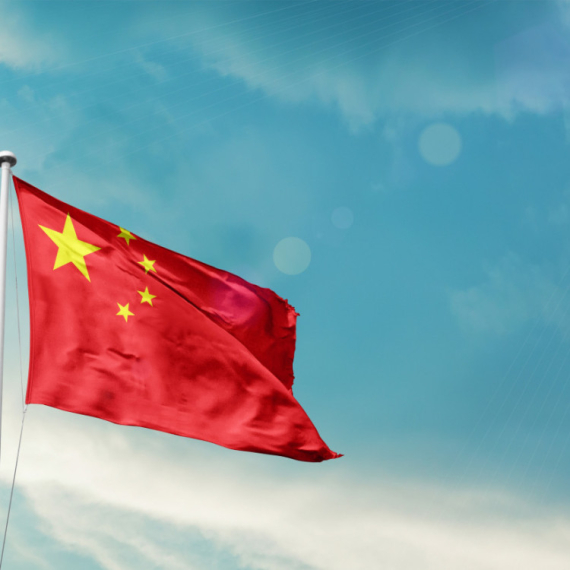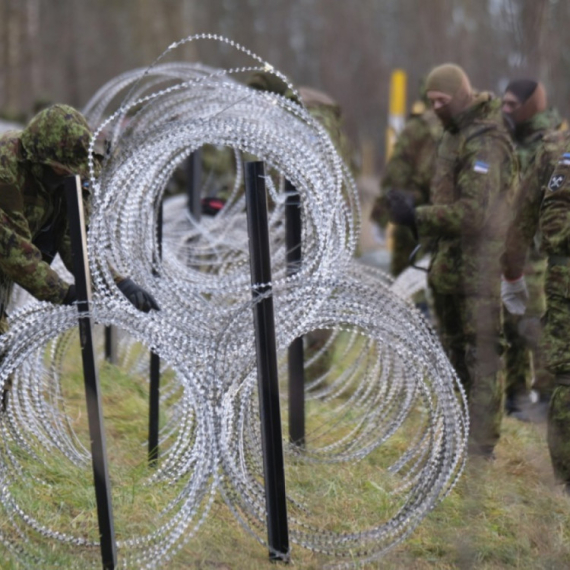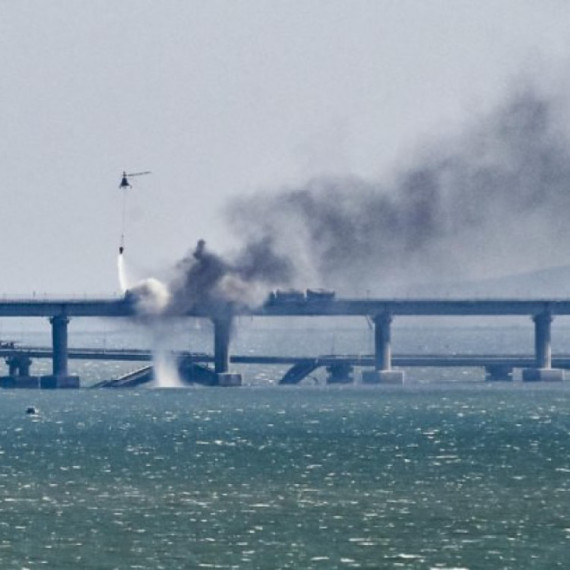Taiwan president elect extends hand to China
Taiwan's president-elect Ma Ying-jeou extended his hand Sunday to big neighbor China.
Sunday, 23.03.2008.
11:30

Taiwan's president-elect Ma Ying-jeou extended his hand Sunday to big neighbor China. He vowied to help pave the way for a century of mutual peace and prosperity in the region, AFP says. Taiwan president elect extends hand to China Buoyed by a landslide election victory on Saturday, Ma said he wanted a "non-denial" agreement that would allow Taiwan and China - which claims sovereignty over the island - to exist side by side. He promised to work for warmer relations, pressing for closer trade ties, direct air and tourism links and a peace treaty that would end decades of hostilities since Taiwan split from the mainland in 1949. Ma appealed for public trust and urged voters to re-elect him four years from now, saying: "If you give me eight years, I will lay the foundation for a century of peace and prosperity." The Harvard-educated opposition Kuomintang candidate won 58 percent of the vote Saturday, trouncing his ruling party challenger Frank Hsieh by almost 17 points and earning the congratulations of U.S. President George W. Bush. Ma said he backed a 1992 consensus between Beijing and Taipei, under which both accepted the formula of "One China" but agreed to interpret it in their own way. He said the old policy of each side denying the other's right to exist was in the past, but that mutual recognition was also "out of the question." Mutual non-denial was the middle road, Ma said. "We will not deny their existence but we cannot recognize their sovereignty" over Taiwan, he said. China has threatened an invasion if the US-allied island declares independence. By returning to the 1992 consensus, Ma said, "We can move ahead to other urgent, less intractable issues." "We want to make sure we are not negotiating Taiwan's future... Taiwan's identity has to be respected. We will negotiate with each other on an equal footing." However Ma -- who formally takes office on May 20 -- said there were "no plans" to visit China. "We want to work on substantive issues. If we are able to do that, we will consider whether a high-level visit is required." The vote had been closely watched by Beijing and Washington for signs of a new approach after eight years of recurring tensions under outgoing President Chen Shui-bian. Ma made improving ties with Beijing a cornerstone of his platform for his KMT party, and that -- along with concern over the stuttering economy -- swept him to victory. Bush, in a written message, said his election offered a fresh chance for bilateral relations with the mainland. "I believe the election provides a fresh opportunity for both sides (China and Taiwan) to reach out and engage one another in peacefully resolving their differences," he added. Ma said he wanted to negotiate on three key issues with China: an economic cooperation agreement; a peace accord including military confidence-building measures to avoid a flashpoint incident; and Taiwan's diplomatic status on the world stage, where it has been squeezed by Beijing. Analysts expect Taiwan and China will soon reopen contacts on tourism and trade through two semi-official bodies. In a wide-ranging news conference here, Ma also reiterated his support for autonomy for Tibet in the wake of China's military crackdown, saying Tibetan spiritual leader Dalai Lama would be "more than welcome" to visit Taiwan. "I think he is a moderate person, very persuasive. That is why I support his idea for autonomy for Tibet," he said. China has refused to talk to the Dalai Lama and accuses his "clique" of orchestrating unrest there. Ma's landslide, coupled with the KMT's crushing defeat of the Democratic Progressive Party in January's parliamentary elections, restores his party to political dominance in Taiwan, eight years after Chen ended its half-century grip on power. His beaten rival Hsieh, meanwhile, kept a low profile. He was whisked away from his home in the morning amid suggestions he was about to resign over the election debacle.
Taiwan president elect extends hand to China
Buoyed by a landslide election victory on Saturday, Ma said he wanted a "non-denial" agreement that would allow Taiwan and China - which claims sovereignty over the island - to exist side by side.He promised to work for warmer relations, pressing for closer trade ties, direct air and tourism links and a peace treaty that would end decades of hostilities since Taiwan split from the mainland in 1949.
Ma appealed for public trust and urged voters to re-elect him four years from now, saying: "If you give me eight years, I will lay the foundation for a century of peace and prosperity."
The Harvard-educated opposition Kuomintang candidate won 58 percent of the vote Saturday, trouncing his ruling party challenger Frank Hsieh by almost 17 points and earning the congratulations of U.S. President George W. Bush.
Ma said he backed a 1992 consensus between Beijing and Taipei, under which both accepted the formula of "One China" but agreed to interpret it in their own way.
He said the old policy of each side denying the other's right to exist was in the past, but that mutual recognition was also "out of the question."
Mutual non-denial was the middle road, Ma said.
"We will not deny their existence but we cannot recognize their sovereignty" over Taiwan, he said.
China has threatened an invasion if the US-allied island declares independence.
By returning to the 1992 consensus, Ma said, "We can move ahead to other urgent, less intractable issues."
"We want to make sure we are not negotiating Taiwan's future... Taiwan's identity has to be respected. We will negotiate with each other on an equal footing."
However Ma -- who formally takes office on May 20 -- said there were "no plans" to visit China.
"We want to work on substantive issues. If we are able to do that, we will consider whether a high-level visit is required."
The vote had been closely watched by Beijing and Washington for signs of a new approach after eight years of recurring tensions under outgoing President Chen Shui-bian.
Ma made improving ties with Beijing a cornerstone of his platform for his KMT party, and that -- along with concern over the stuttering economy -- swept him to victory.
Bush, in a written message, said his election offered a fresh chance for bilateral relations with the mainland.
"I believe the election provides a fresh opportunity for both sides (China and Taiwan) to reach out and engage one another in peacefully resolving their differences," he added.
Ma said he wanted to negotiate on three key issues with China: an economic cooperation agreement; a peace accord including military confidence-building measures to avoid a flashpoint incident; and Taiwan's diplomatic status on the world stage, where it has been squeezed by Beijing.
Analysts expect Taiwan and China will soon reopen contacts on tourism and trade through two semi-official bodies.
In a wide-ranging news conference here, Ma also reiterated his support for autonomy for Tibet in the wake of China's military crackdown, saying Tibetan spiritual leader Dalai Lama would be "more than welcome" to visit Taiwan.
"I think he is a moderate person, very persuasive. That is why I support his idea for autonomy for Tibet," he said. China has refused to talk to the Dalai Lama and accuses his "clique" of orchestrating unrest there.
Ma's landslide, coupled with the KMT's crushing defeat of the Democratic Progressive Party in January's parliamentary elections, restores his party to political dominance in Taiwan, eight years after Chen ended its half-century grip on power.
His beaten rival Hsieh, meanwhile, kept a low profile. He was whisked away from his home in the morning amid suggestions he was about to resign over the election debacle.















































Komentari 0